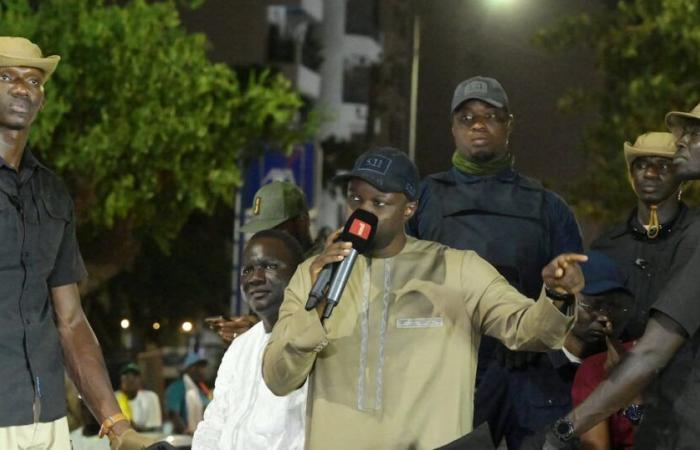“I pay tribute to the Senegalese people for the large victory they gave to Pastef”, the party of the president and the Prime Minister, declared government spokesperson Amadou Moustapha Ndieck Sarré on the TFM channel, specifying that he was in possession of “90 to 95% of the results”.
“The strong trends show that Pastef will have a qualified majority,” he said without specifying how many seats Pastef would have.
Reliable projections of the new Assembly could be available by Monday morning thanks to the media.
Pastef came out on top in a large majority of voting centers for which the media announced the provisional results as they were posted.
Two of the main leaders of the opposition list, the mayor of Dakar Barthélémy Dias and the runner-up in the 2024 presidential election Amadou Ba, as well as other opponents of Pastef congratulated the latter.
Pastef beat MM. Dias and Ba in their polling station, according to partial results.
The head of government Ousmane Sonko largely wins in his office in Ziguinchor (south), these results indicate.
Read also: Senegal: 104 ECOWAS and AU observers deployed for this Sunday’s early legislative elections
No significant incidents have been reported. The Takku Wallu Senegal coalition of former President Macky Sall, however, denounced in a press release a “massive fraud organized by Pastef”.
Various actors reported a lower participation than that of the presidential election in March (61.3%). In the 2022 legislative elections, 46.6% of those registered voted.
Mademba Ndiaye, a twenty-year-old student, voted for the first time in the capital: “it’s one of the only means we have to really impact society and I tell myself that if we don’t vote, we won’t be able to not, afterwards, come and mope about what is happening in society.”
Pascal Goudiaby, 56, hoped that “Pastef (wins) the elections to have the majority (…) to better carry out their mandate. The priority is unemployment, young people are so faced with unemployment.”
Bassirou Diomaye Faye was elected president in the first round in March, devoid of any executive experience but pulled to the top by the enthusiasm and aspiration for change of a young population tested by three years of political confrontation and economic crisis .
His fiery mentor Ousmane Sonko, who should have been in his place if his candidacy had not been invalidated, became Prime Minister.
For months, these advocates of “left-wing Pan-Africanism” led a conflictual cohabitation with an Assembly still dominated by the former presidential majority. Mr. Faye dissolved it as soon as constitutional deadlines permitted, in September.
Around 7.3 million voters were therefore called on Sunday to elect 165 deputies who will sit for five years.
Read also: Senegal needs nearly 18,500 billion CFA francs to finance its 2025-2029 economic plan
Voters had to decide whether or not to give the Faye-Sonko duo the means to keep their promises: to improve the life of a population, a large part of which struggles on a daily basis to make ends meet, to share with them the income from natural resources such as hydrocarbons and fishing which would have been sold off abroad, fight corruption, transform the State and its justice…
“Everything is expensive”
“I think that the one to whom you gave confidence in the presidential election, we must renew the confidence in him so that he can accomplish what he has started. We want life to cost less for the Senegalese. Everything is expensive, water, electricity, food,” said Touré Aby, 56 years old.
The cost of living remains a major concern, as does unemployment, at more than 20%. The new leaders are in turn confronted with the wave of these hundreds of compatriots who leave each month in canoes to seek a better future in Europe.
Historically, the Senegalese have aligned their choice of presidential and legislative elections and Mr. Sonko’s party of African Patriots of Senegal for work, ethics and fraternity (Pastef) was given the favorite by the experts.
Dispersed opposition
Opposite, the opposition was dispersed. She campaigned by taking up the grievance formulated by a certain number of Senegalese according to which, for eight months, Mr. Sonko spoke a lot and acted little. The person concerned defends himself by arguing the state in which he and Mr. Faye found the country and the multiple resistance to the undertaking of changing practices and the system.
Par Le360 Africa (with AFP)
11/18/2024 at 7:13 a.m.






